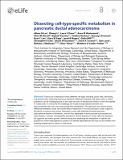Dissecting cell-type-specific metabolism in pancreatic ductal adenocarcinoma
Author(s)
Lau, Allison N; Li, Zhaoqi; Danai, Laura V; Westermark, Anna M; Darnell, Alicia M; Ferreira, Raphael; Gocheva, Vasilena; Sivanand, Sharanya; Lien, Evan C; Sapp, Kiera M; Mayers, Jared R; Biffi, Giulia; Chin, Christopher R; Davidson, Shawn M; Tuveson, David A; Jacks, Tyler; Matheson, Nicholas J; Yilmaz, Omer; Vander Heiden, Matthew G; ... Show more Show less
DownloadPublished version (4.676Mb)
Publisher with Creative Commons License
Publisher with Creative Commons License
Creative Commons Attribution
Terms of use
Metadata
Show full item recordAbstract
© Lau et al. Tumors are composed of many different cell types including cancer cells, fibroblasts, and immune cells. Dissecting functional metabolic differences between cell types within a mixed population can be challenging due to the rapid turnover of metabolites relative to the time needed to isolate cells. To overcome this challenge, we traced isotope-labeled nutrients into macromolecules that turn over more slowly than metabolites. This approach was used to assess differences between cancer cell and fibroblast metabolism in murine pancreatic cancer organoid- fibroblast co-cultures and tumors. Pancreatic cancer cells exhibited increased pyruvate carboxylation relative to fibroblasts, and this flux depended on both pyruvate carboxylase and malic enzyme 1 activity. Consequently, expression of both enzymes in cancer cells was necessary for organoid and tumor growth, demonstrating that dissecting the metabolism of specific cell populations within heterogeneous systems can identify dependencies that may not be evident from studying isolated cells in culture or bulk tissue.
Date issued
2020Department
Koch Institute for Integrative Cancer Research at MIT; Massachusetts Institute of Technology. Department of BiologyJournal
eLife
Publisher
eLife Sciences Publications, Ltd